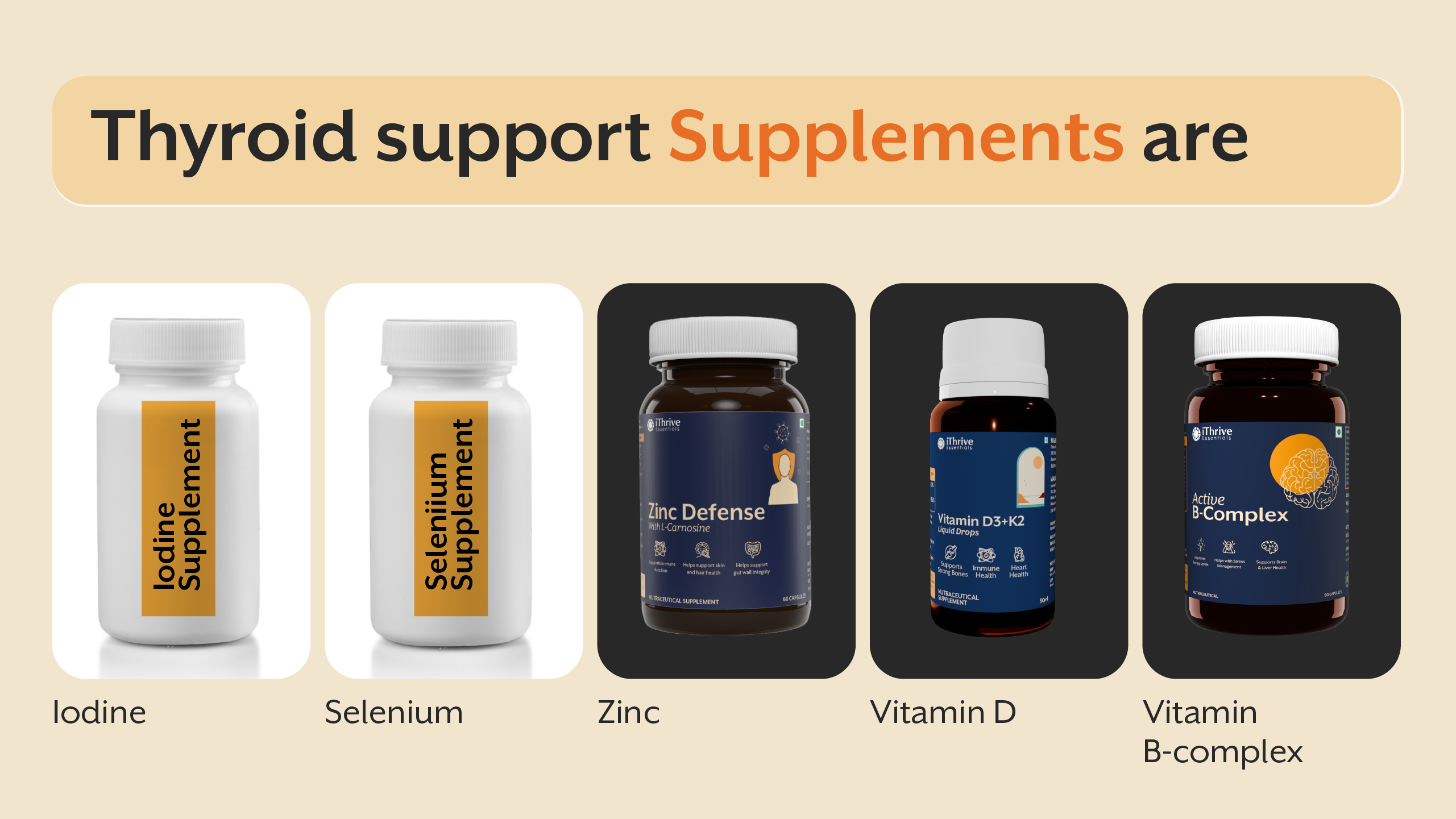Do you feel that your body has slowed down? Do you also feel lethargic? You don’t get excited about any new opportunity and think about how much work it's going to be. Then you might be struggling with Hypothyroidism. An estimated 42 million people, or about 1 in 10 adults, have thyroid disorders.1 Hypothyroidism can affect individuals of all age groups. Therefore, everyone must be vigilant for symptoms and alert when any signs appear.
What is Hypothyroidism?
The thyroid is a small butterfly-shaped gland at the base of the neck, below the Adam’s apple. The thyroid gland makes two main hormones: thyroxine (T-4) and triiodothyronine (T-3).
Hypothyroidism, also known as an underactive thyroid, is a condition in which thyroid glands don’t make or release enough hormones into your bloodstream. A key indicator of hypothyroidism is an elevated level of thyroid-stimulating hormone (TSH). When thyroid hormone levels are low, the pituitary gland increases TSH production to stimulate the thyroid gland. As a result, metabolism gets slow. This leads to unintentional weight gain and makes you feel exhausted all the time. Thyroid hormones manage growth, cell repair, and metabolism. Every cell in the body can be affected by these hormones.
What are the symptoms of Hypothyroidism?

The severity of the condition depicts the symptoms of hypothyroidism. The symptoms may take time to show up as the problems develop slowly over the years. One might notice the symptoms a little later in life. Your metabolism continues to slow down and you may end up with more obvious problems. Symptoms of hypothyroidism may include:
1. Dry skin
2. Puffy face
3. Tiredness
4. More sensitivity to cold
5. Constipation
6. Hoarse voice
7. Hair loss
8. Muscle weakness
9. Depression
10. Memory problem
11. Slowed heart rate, also called bradycardia
12. Menstrual cycles that are heavier than usual or irregular
What are the causes of Hypothyroidism?

The hormones produced by the thyroid gland, thyroxine (T-4) and triiodothyronine (T-3), support the rate at which the body uses fats and carbohydrates. They help control body temperature, affect heart rate, and control how much protein the body makes. Hypothyroidism is a result of the thyroid gland not making enough hormones. Problems or conditions that can lead to hypothyroidism are as follows:
1. Autoimmune disease: This happens when the immune system makes antibodies that attack healthy tissues. The most common autoimmune disease is Hashimoto’s disease.
2. Iodine deficiency: It is crucial for thyroid hormone production.2 Supplements are required if a person is suffering from nutrient deficiencies.
3. Thyroiditis: Inflammation of your thyroid gland. Usually, it first results in brief hyperthyroidism, followed by temporary or persistent hypothyroidism.
4. Thyroid surgery: Thyroid hormone production can be reduced or stopped entirely via surgery that removes all or part of the gland.
5. Medications: Medications such as lithium and amiodarone can interfere with thyroid hormone production.
6. Radiation therapy: Hypothyroidism can result from thyroid gland damage caused by radiation therapy used to treat head and neck cancers.
7. Chronic Stress: Prolonged stress elevates cortisol levels, which can interfere with thyroid hormone production.
8. Environmental Pollutants and Toxins: Your thyroid and immune system may be overburdened by heavy metals and endocrine disruptors found in household and personal care items (such as shampoos, cosmetics, and chlorine in swimming pools and water).
10. Nutrient Deficiencies: Beyond iodine, deficiencies in nutrients like selenium, iron, vitamin D, and zinc can impair thyroid function.
11. Lifestyle and Dietary Factors: Certain lifestyle choices and dietary habits can influence thyroid health. For instance, smoking has been observed to decrease thyroid-stimulating hormone (TSH) levels and increase triiodothyronine (T3) and thyroxine (T4) levels, potentially disrupting normal thyroid function.
How can Functional nutrition help with Hypothyroidism?

Functional nutrition is a holistic approach to lifestyle and dietary change via interpreting the root cause analysis. It focuses on understanding and addressing the underlying cause of health issues through tailored nutrition plans and lifestyle modifications. At iThrive when it comes to hypothyroidism we do help you be and feel healthy through a balanced diet and change in lifestyle but we take free T3 and T4 (unbound forms of the thyroid hormones, triiodothyronine (T3) and thyroxine (T4) into consideration, unlike other consultancies that cater to your total T3 and total T4. Certain Thyroid support supplements are iodine, selenium, zinc, vitamin D, and Vitamin B12, these are some of the basic nutrients that functional nutrition includes in the best diet for hypothyroidism patients.
An anti-inflammatory diet is recommended to reduce inflammation, which can be achieved by removing foods such as gluten, dairy, and processed sugar. Nutritionists at iThrive test your antibodies, such as TRAB (Thyroid-Stimulating Hormone Receptor Antibody), TPO (Thyroid Peroxidase), and TGAB (Thyroglobulin Antibodies), to learn about autoimmunity. We then suggest removing certain foods from your diet. Along with that, we work on stress management- physical and emotional. iThrive also recommends that sleep is a key principle when it comes to healing.
Foods to Include and Avoid in Your Hypothyroidism Diet
Managing hypothyroidism effectively involves more than just medication; dietary choices play a crucial role in supporting thyroid function. While certain foods can enhance thyroid health, others may interfere with hormone production or medication absorption. Being mindful of these foods and consuming them with caution can help alleviate symptoms and improve overall well-being. So here is a list of the foods to include and avoid in your Hypothyroidism diet-

*Goitrogen- Natural compounds called goitrogens, which are present in several meals, might affect thyroid function, especially in people who have hypothyroidism. They may interfere with thyroid hormone synthesis, resulting in symptoms like exhaustion, weight gain, and cold sensitivity. Goitrogens can block iodine transport into the thyroid gland. They can inhibit TPO and more.*
Conclusion
Functional nutrition offers a comprehensive approach to managing hypothyroidism by addressing the root cause of thyroid dysfunction through personalized dietary and lifestyle interventions. This approach emphasizes the importance of essential nutrients such as selenium, zinc, vitamin B12, and more which are crucial for thyroid hormone production and conversion. Incorporating an anti-inflammatory diet, optimizing gut health, and managing stress are key components of functional nutrition that support thyroid health and overall well-being.
Functional nutrition seeks to improve the quality of life for those with hypothyroidism by restoring thyroid gland balance, reducing symptoms, and emphasizing tailored care and holistic approaches. To ensure safe and efficient management of the illness, functional nutrition should be undertaken under the supervision of medical professionals, even though it can supplement traditional treatments.
Reference
1. Diagnostics, N. (2023, December 30). Hypothyroidism in India: symptoms, cause, and treatment. Nisarga Diagnostics. https://nisargadiagnostics.com/hypothyroidism-in-india-symptoms-cause-and-treatment/
2. Thyroid disease. (2025, March 19). Cleveland Clinic. https://my.clevelandclinic.org/health/diseases/8541-thyroid-diseas
3. DTE Staff, & DTE Staff. (2018, September 21). 1 in 10 Indians have hypothyroidism. Down to Earth. https://www.downtoearth.org.in/health/1-in-10-indians-have-hypothyroidism-61693
Subscribe to our newsletter and receive a selection of cool articles every week




.png)


.webp)

.jpg)





